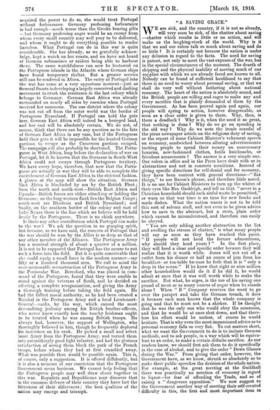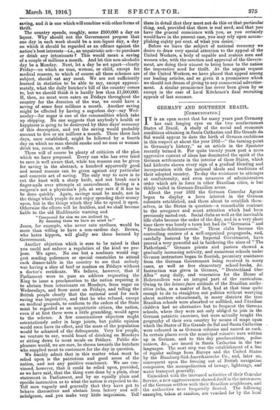"A SAVING GRACE."
WE are sick, and the country, if it is not so already, will very soon be sick, of the chatter about saving —chatter which results in little or no action, and will make us the laughing-stock of the world. iVhy is it that we and our rulers talk .so much about saving and do so little ? It is certainly not because the nation is under any delusion in regard to the facts. The need for saving is patent, not only to meet the vast expense of the war, but in the special circumstances of the moment. The dearth of shipping and the physical inability of moving much of our supplies with which we are already faced are known to all. Nobody can be found of sufficient hardihood to say that there is no need to worry about personal saving, or that we shall do very well without bothering about national economy. The heart of- the nation is absolutely sound, and the British people are willing and eager to make any and every sacrifice that is plainly demanded of them by the Government. As has been proved again and again, our people will spring to action, however disagreeable, as soon as a clear order is given to them. Why, then, is there a deadlock ? Why is it, when the need is so great, that nothing is done ? Why do we go on spending in the old way ? Why do we note the ironic scandal of the pious newspaper article on the religious duty of saving, or the report of some Cabinet Minister's vehement speech on economy, sandwiched between alluring advertisements inciting people to spend their money on unnecessary luxuries, new-fashioned clothes, futile knicknacks, or frivolous amusements ? The answer is a very simple one. Our rulers in office and in the Press have dealt with us in abstractions and not in concrete monitions. Instead of giving specific directions for self-denial and for economy, they have been content with general directions—" flat things," to use Bacon's phrase, and therefore little noted. It is no use for Cabinet Ministers to turn up the whites of their eyes like Mrs. Gashleigh, and tell us that " never in a Christian household should such sinful waste be permitted," or warn us that war time is no time for new frocks and made dishes. What the nation wants is not to be told this sort of solemn stuff, and not even to be given advice how to save in the abstract, but a stern, plain order which cannot be misunderstood, and therefore can easily be obeyed. " You are only adding another abstraction to the list and swelling the stream of chatter," is what many people will say as soon as they have reached this point. " If people will not heed the former admonitions, why should they heed yours I " In the first place, they will heed a clear and specific order because they will realize that it is worth while. Jones will not cut off a cutlet from his dinner or half an ounce of jam from his breakfast- or tea-table because he feels that it is " only a drop in the ocean." If he knew that eight or nine million other householders would do it if ho did it, he would admit at once that it was well worth while to make the sacrifice. But what, he urges, is the use of his saving one pound of meat or so many ounces of sugar when he stands alone ? When " B " Company receives the word to go over the parapet and take the German trench, it does it because each man knows that the whole company is going and that he must not be a shirker. If he thought that he was the only one who would obey the summons, and that he would be at once shot down, and that there- fore his effort would be useless, of course he would hesitate. That is why even the most impassioned advice as to personal economy falls so very flat. To cut matters short, what we want the Government to do is to imitate German methods, and to ask people, in a way which will be equiva- lent to an order, to make a certain definite sacrifice. As our readers know, we should first ask them to do it specifically in the case of alcohol, and to give the order " Down Glasses during the War." From giving that order, however, the Government have, as we know, shrunk so absolutely as to make their public speeches the derision of the whole nation. For example, at the great meeting at the Guildhall there was practically no mention of economy in regard to liquor—for fear of offending the Trade, and so of raising a " dangerous opposition." We now suggest to the Government another way of meeting their self-created difficulty •in this, the first and most important item in one day in each week should be a non-liquor day, a day plishing eighty per cent. of what you desire.--, • country for the- duration of the war, we could have a saving of some four millions a month. Another saving. might be effected by having a sugarless day—say Wed- nesday—for sugar is one of the commodities which take [CommunicaTen.] be done- quickly. Again, savings must be made, not in About the year 1892 the German Consular Agents the things which people do not enjoy spending their money began to display a keen interest in the German upon, but in the things which they like to spend it upon. colonists established, and those about to establish them- Otherwise the efforts will be fruitless, and we shall become selves, in the States in question—a remarkable contrast liable to the old Hudibrastic warning and to the arrogance and scant attention which had been Jones, for example, who never eats sardines, would be time there was barely a town but had its " Gernaania " and more than willing to have a non-sardine day. Brown, , " Deutsche-Schtitzenverein." These clubs became the who hates kippers, will gladly see these banned by ; controlling centres of a well-organized propaganda, and, Government. carefully fostered by the Imperial Government, have Another objection which is sure to be raised is that • proved a very powerful aid in furthering the aims of " The you could not enforce a regulation of the kind we pro- Fatherland." German priests and pastors. glowed -a, pose. We agree. No one but a madman would sug- ' gradually increasing activity, and numerous schools under gest sending policemen or special constables to attend, German instructors began to flourish, pecuniary assistance each dinner-table in the country to see that nobody from the German Government being received in many was having a slice of beef or mutton on. Fridays without , cases, as well as free elementary school-books, &c. a doctor's certificate. We believe, however, that if Instruction was given in German, " Deutschland tiber Parliament were to pass an address requesting the Alles " sung daily, and veneration for the House of King to issue a proclamation to the nation requiring it Hohenzollern was an integral part, of the curriculum, to abstain from intoxicants on Mondays, from sugar on Owing to the laissez-faire attitude of the Brazilian autho- Wednesdays, and from meat on Fridays, and telling the rities (who, as a matter of fact, had at that time quite British people clearly that the national need for such enough to do to straighten, out politics without worrying saving was imperative, and that he who refused, except about matters educational), in many districts the true en medical grounds, to conform to the orders of the State Brazilian schools were absorbed or nullified, an•Erazilinn would be ashamed of the delinquents. Very few people, were coloured in as German colonies and named as such. we venture to say, would boast of drinking on Mondays In certain places even the municipal minutes were written or sitting down to meat meals on Fridays. Public dis- up in. German, and to this day proclamations,-- police pleasure would, we are sure, be shown towards the butchers notices, &c., are issued in Santa Catharina in the two who supplied meat to customers for the day in question. languages. The next step was the establishment of a line We frankly admit that in this matter what must be of regular sailings from Europe and the United Staten relied upon is the patriotism and good sense of the by the Hamburg-Sud-Amcrikanische Co., and, later on, nation, and not any positive enactment. We are con- consequent upon the freezing out of British navigation vinced, however, that it could be relied upon, provided, companies, the monopolization of towage, lighterage, and as we have said, that the thing were done by a plain, clear water transport generally. statement in Parliament, and by an equally plain and Coincident with the increased activities of their Consular specific instruction as to what the nation is expected to do. Service, a new aggressiveness showed itself in the intercourse Tell men vaguely and generally that they have got to of the German settlers with their. Brazilian neighbours, and behave themselves and abstain from luxury and self- the authorities were frequently flouted. The folldwing indulgence, and you make very, little impression. Tell, examples, taken at random, are vouched for by the local saving, and it is one whichwill combine with other forms of them in detail .that they must not do this or that particular thrift. thing, and, provided that there is real need, and that you The country spends, roughly, some £500,000 a day on have the general conscience with you,' as you certainly liquor. Why should not the Government propose that would have in the present case, you may rely upon accom- on which it should be regarded as an offence against the Before we leave the subject of national economy we nation's best interests--i.e., an unpatriotic act—to purchase desire to draw very special attention to the appeal. of the or drink any intoxicants T This would mean a saving United Workers, a body of capable and zealous men and of a couple of millions a month, And let this non-alcoholic women who, with the sanction and approval of the .Govern- day be a Monday. Next, let a day be set apart—clearly ment, are doing their utmost to bring home to the nation Friday—on which no man, woman, or child, except for • the imperative need for thrift. At the urgent request medical reasons, to which of -course all these schemes are of the United Workers, we have placed that appeal among subject, should eat any meat. We are not sufficiently our leading articles, and so given it a prominence ,whiels learned in statistics to be able to say, except approxi- we should not dream of giving to any commercial advertise- mately, what the daily butcher's bill of the country comes ment. A similar prominence has never been given by us to, but-we should think it is hardly less than £1,000,000. except in the case of Lord Kitchener's final recruiting If, then, no meat were eaten on Fridays throughout the appeals of last summer.



































 Previous page
Previous page